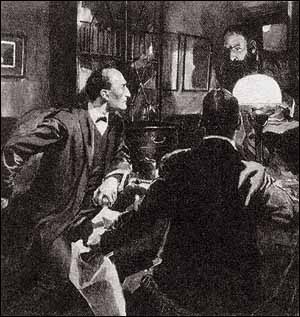| The Disappearance of Lady Frances Carfax 5 | The Disappearance of Lady Frances Carfax 6 |
For two days the Hon. Philip Green (he was, I may mention, the son of the famous admiral of that name who commanded the Sea of Azof fleet in the Crimean War) brought us no news. On the evening of the third he rushed into our sitting-room, pale, trembling, with every muscle of his powerful frame quivering with excitement.

“We have him! We have him!” he cried.
He was incoherent in his agitation. Holmes soothed him with a few words and thrust him into an armchair.
“Come, now, give us the order of events,” said he.
“She came only an hour ago. It was the wife, this time, but the pendant she brought was the fellow of the other. She is a tall, pale woman, with ferret eyes.”
“That is the lady,” said Holmes.
“She left the office and I followed her. She walked up the Kennington Road, and I kept behind her. Presently she went into a shop. Mr. Holmes, it was an undertaker’s.”
My companion started. “Well?” he asked in that vibrant voice which told of the fiery soul behind the cold gray face.
“She was talking to the woman behind the counter. I entered as well. ‘It is late,’ I heard her say, or words to that effect. The woman was excusing herself. ‘It should be there before now,’ she answered. ‘It took longer, being out of the ordinary.’ They both stopped and looked at me, so I asked some question and then left the shop.”
“You did excellently well. What happened next?”
“The woman came out, but I had hid myself in a doorway. Her suspicions had been aroused, I think, for she looked round her. Then she called a cab and got in. I was lucky enough to get another and so to follow her. She got down at last at No. 36, Poultney Square, Brixton. I drove past, left my cab at the corner of the square, and watched the house.”
“Did you see anyone?”
“The windows were all in darkness save one on the lower floor. The blind was down, and I could not see in. I was standing there, wondering what I should do next, when a covered van drove up with two men in it. They descended, took something out of the van, and carried it up the steps to the hall door. Mr. Holmes, it was a coffin.”
“Ah!”
“For an instant I was on the point of rushing in. The door had been opened to admit the men and their burden. It was the woman who had opened it. But as I stood there she caught a glimpse of me, and I think that she recognized me. I saw her start, and she hastily closed the door. I remembered my promise to you, and here I am.”
“You have done excellent work,” said Holmes scribbling a few words upon a half-sheet of paper. “We can do nothing legal without a warrant, and you can serve the cause best by taking this note down to the authorities and getting one. There may be some difficulty, but I should think that the sale of the jewellery should be sufficient. Lestrade will see to all details.”
“But they may murder her in the meanwhile. What could the coffin mean, and for whom could it be but for her?”
“We will do all that can be done, Mr. Green. Not a moment will be lost. Leave it in our hands. Now, Watson,” he added as our client hurried away, “he will set the regular forces on the move. We are, as usual, the irregulars, and we must take our own line of action. The situation strikes me as so desperate that the most extreme measures are justified. Not a moment is to be lost in getting to Poultney Square.
| The Disappearance of Lady Frances Carfax 5 | The Disappearance of Lady Frances Carfax 6 |